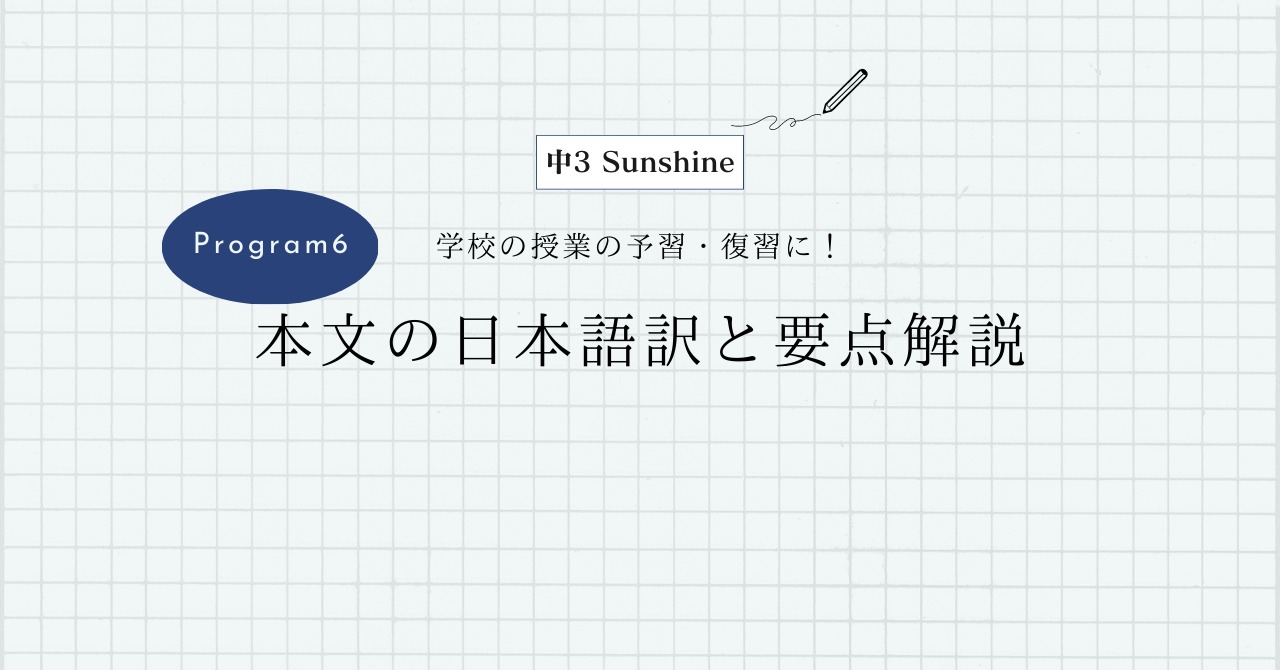開隆堂 中学3年生 Sunshine(サンシャイン) Program6 Part3の本文の日本語訳と重要箇所の解説です。
Program6-Scenes, 6-1, 6-2の解説はこちらからご覧ください。
>中3Sunshine Program6 Scenes 本文和訳
>中3Sunshine Program6 Part1 本文和訳
>中3Sunshine Program6 Part2 本文和訳
- Program6 Part3 本文と日本語訳
- Program6 Part3 重要事項の解説
- When Boyan Slat was 16, he went diving in Greece.
- He was surprised to see so much garbage there.
- Two years later, he started the Ocean Cleanup project to solve this problem.
- The cleanup system Boyan invented collects plastic trash in the ocean.
- Huge screens catch the plastic without hurting sea animals.
- “Don’t we all want a future that is better than the present?” Boyan said.
- “We can actually make things better again, and we can do this, and we must do this, and we will do this.”
- Program6 Part3 まとめ
Program6 Part3 本文と日本語訳
When Boyan Slat was 16, he went diving in Greece.
「ボイヤン・スラットさんが16歳の時,ギリシャにダイビングに行きました。」
He was surprised to see so much garbage there.
「彼はそこでとてもたくさんのゴミを見て驚きました。」
Two years later, he started the Ocean Cleanup project to solve this problem.
「2年後,彼はこの問題を解決するためにオーシャン・クリーンアップ・プロジェクトを始めました。」
The cleanup system Boyan invented collects plastic trash in the ocean.
「ボイヤンさんが発明したクリーンアップシステムは海のプラスチックゴミを集めます。」
Huge screens catch the plastic without hurting sea animals.
「巨大なスクリーンが海洋生物を傷つけることなくプラスチックを回収します。」
“Don’t we all want a future that is better than the present?” Boyan said.
「ボイヤンさんは『私たちはみんな現在よりも良い未来が欲しくはないですか?』と言っていました。」
“We can actually make things better again, and we can do this, and we must do this, and we will do this.”
『私たちは実際にもう一度状況を良くすることができるし,これをすることができるし,しなければならないし,こうするつもりなのです。』

Program6 Part3 重要事項の解説
When Boyan Slat was 16, he went diving in Greece.
この文では「接続詞when」が使われていますね。
“go -ing”は「~しに行く」という意味になります。他には“go shopping(買い物に行く)”, “go swimming(泳ぎに行く)”などがありますね。
“Greece”は「ギリシャ」ですね。
He was surprised to see so much garbage there.
“be surprised”は「驚く」という表現になります。
“to see”は「不定詞の副詞的用法」で,驚いた理由を表していますね。
“so much”は「非常に多くの」,“garbage”は「ゴミ」という名詞になります。
Two years later, he started the Ocean Cleanup project to solve this problem.
“later”は「~後,その後」という副詞です。
“solve”は「を解決する」という動詞で,“to slve”は「不定詞の副詞的用法」になっていますね。
“project”は「計画,企画」,“problem”は「問題」という名詞です。
The cleanup system Boyan invented collects plastic trash in the ocean.
この文では「目的格の関係代名詞」が使われていて,“Boyan invented”が先行詞“The cleanup system”を修飾していますね。
関係代名詞”that/which”は省略されています。
“invent”は「を発明する」,“collect”は「を集める」という動詞です。
“trash”は「ゴミ」,“ocean”は「海,大洋」という名詞ですね。
Huge screens catch the plastic without hurting sea animals.
“huge”は「巨大な」という形容詞で,“screen”は「スクリーン」という名詞です。
“catch”は「捕まえる」という動詞ですが,今回は「回収する」と訳しました。
“without”は「~なしで」という重要な前置詞になります。
“hurt”は「を傷つける」という動詞で,ここでは前置詞の後ろなので「動名詞」になっていますね。
“Don’t we all want a future that is better than the present?” Boyan said.
この文は“Do”ではなく“Don’t”から始まっているので「否定疑問文」です。意味は「~ではないですか?」となります。
また,この文でも「主格の関係代名詞」が使われていて,“that is better than the present”が先行詞“a future”を修飾していますね。
さらに「比較級」も使われていますね。“present”は「現在」という名詞です。
“We can actually make things better again, and we can do this, and we must do this, and we will do this.”
“actually”は「実際に,実は」という副詞です。
“make A B”は「AをB(の状態)にする,させる」という重要表現になります。
“thing”は「もの,こと」という名詞ですが,複数形だと「現状,状況」といった意味にもなりますよ。
“again”は「再び,もう一度」という副詞です。
“do”は代動詞で,“do this”で“make things better again”を指していますね。“must”は「~しなければならない」という助動詞です。
Program6 Part3 まとめ
以上がProgram6 Part3の日本語訳となります。
「主格・目的格の関係代名詞」の使い方を確実にマスターしましょう!
>中3Sunshine Program6 Scenes 本文和訳
>中3Sunshine Program6 Part1 本文和訳
>中3Sunshine Program6 Part2 本文和訳
何か分からない点や他に解説してほしい点があれば,お気軽にコメントしてください!




コメント